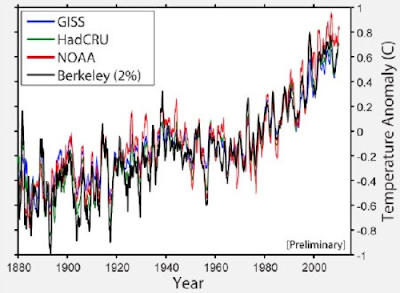In 2010 Muller started up the Berkeley Earth Surface Temperature project (BEST) to do his own "critical analysis" of worldwide climate data. The Koch Foundation, founded by the petroleum industry's billionaire Koch brothers who have been major funders of the climate-change denial machine, has donated nearly 25 percent of the financial support for Muller's project.

Composite Graph of Data from Four Climate Research Groups prepare by Dr. Richard Muller from University of California and presented to congress during his testimony before the House Committee on Science, Space, and Technology
Skeptics of climate science have been eagerly awaiting his BEST research report, which they hoped would undermine the data behind basic theories of anthropogenic climate change. But Muller threw those skeptics for a loop with the graph at right.
You don't have to be a Berkeley PhD to see that Muller's data (black line) tracks pretty well with the three established data sets showing global warming.
Muller's graph represented just an initial sampling of climate data—just 2 percent of the 1.6 billion records he's working with—but those early findings were incredibly consistent with the previous findings of global warming and climate change. In his March 2011 testimony, Muller told the House Committee on Science that the three main climate models in use today—each of which uses a different estimating technique—are all pretty accurate; That global temperatures have gone up considerably over the past century; and the increase has accelerated over the past few decades.
Yesterday, BEST confirmed the findings Muller outlined in his testimony before the House Committee on Science and provided additional details in its first set of published papers about land temperatures. (Ocean studies will come later.) Using an intricate statistical methodology that incorporates more data than other climate models (summarized by the Economist here), the BEST researchers drew several conclusions:
- The earth is indeed getting warmer - as shown in the graph (shown above) Muller presented to the House Committee on Science. Global average land temperatures have risen 0.91 degrees Celsius over the past 50 years. This is "on the high end of the existing range of reconstructions."
- The rate of increase on land is accelerating. Warming for the entire 20th century clocks in at 0.73 degrees C per century. But over the most recent 40 years, the globe has warmed at a rate of 2.76 degrees C per century.
- Warming has not abated since 1998. The rise in average temperature over the period 1998-2010 is 2.84 degrees C per century.
- The BEST data significantly reduces the uncertainty of the temperature reconstructions. Their estimate of the temperature increase over the past 50 years has an uncertainty of only 0.04 degrees C, compared to a reported uncertainty of 0.13 degrees C in the most recent Intergovernmental Panel on Climate Change report.
- Although many of the temperature measuring stations around the world have large individual uncertainties, taken as a whole the data is quite reliable. The difference in reported averages between stations ranked "okay" and stations ranked "poor" is very small.
- The urban heat island effect—i.e., the theory that rising temperatures around cities might be corrupting the global data—is very small.
In the press release announcing the results, Muller said, "Our biggest surprise was that the new results agreed so closely with the warming values published previously by other teams in the US and the UK." In other words, climate scientists know what they're doing after all.
The BEST report is purely an estimate of planetary warming, and it makes no estimate of how much this warming is due to human activity. So in one sense, its impact is limited since the skeptics, sensing they are loosing the climate change denial argument, have already abandoned the augment that it is all a hoax, as Tx Gov. Perry claims, and now focus their new denial argument solely on the contention that human CO2 emissions is the cause of global warming.
Marc Morano, a former aide to a lead global warming denier Sen. James Inhofe (R-OK) and author of the website Climate Depot has a different, more subtle line of attack: “The climate debate has not centered on whether the Earth has warmed since the end of the Little Ice Age about 1850 or since the 1950s. The climate debate is about how much humans may or may not be contributing to the warming trend,” Morano wrote Friday, calling Muller a “befuddled warmist.”
Climate Depot since at least March of 2011 had been publicly warning that Muller’s entire BEST project was a predetermined con set up to take down a straw man argument. See: On 3-23-11, Climate Depot wrote in group email to fellow skeptics: ‘This whole [Muller] project has to be a set up to screw skeptics. Who disputes warming has taken place? Why have we allowed Muller to set up a straw man argument to take cheap shots at skeptics? It appears Muller is incapable of running this project.
Some deniers have even given up on denying that human CO2 emissions are, at least, one of the main causes of warming and now merely argue that it's economically pointless to try to stop it.
Still, the fact that climate scientists turned out to be careful and thorough in their basic estimates of temperature rise surely enhances their credibility in general. Climategate was always a ridiculous sideshow, and this is just one more nail in its coffin. Climate scientists got the basic data right, and they've almost certainly gotten the human causes right too.
Related:
No comments:
Post a Comment